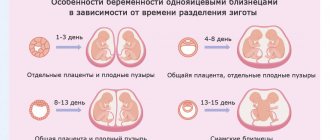17.07.2020 24075 0
The seventh week of pregnancy is almost the middle of the first trimester. At this time, the future systems of the child’s body are actively developing, so a woman should take special care of her condition. Registration, tests, ultrasound - for those who become mothers for the first time, all this looks like a completely new world. And there is no need to be afraid of it: the main thing is to understand what is happening and know what to expect.
Belly in the seventh week of pregnancy
At this stage, the fetus is still small, so pregnancy does not affect the size of the abdomen in any way. This is proven by numerous photos on the Internet. The tummy has not yet begun to grow, but the breasts may become enlarged: this is due to hormonal changes in the body and is completely normal. Some may note that buttoning your pants has become a little more difficult, but this is not due to the growth of the belly, but to bloating. The fact is that the hormone progesterone, which is actively released during pregnancy, affects the motility of the gastrointestinal tract and can provoke such symptoms. But if the expectant mother notices swelling, it is better to consult a doctor. At this time, they can be an alarming sign.
I enjoy every moment of life
My baby!
You are growing so fast!
And more and more I feel how every part of my being helps your cells grow. They are like tender green spring leaves, gaining strength and growth with every drop of water from the strong branches of the mother tree. You have already grown to the size of a pea, 11–13 mm. Your legs are outlined in the form of fins, and the rudiments of the arms are divided into shoulders and forearms. They will become strong, strong, and one day you will jump and frolic joyfully, like a lamb in a spring meadow. Your heart divided into left and right chambers, and the rudiments of bronchi appeared in your lungs - channels through which air enters. Eyes and nostrils develop.
Now you and I are connected by an even more reliable and amazing connection of the umbilical cord - from me to you it carries oxygenated blood and nourishes you. I walk in gardens and parks, deeply inhaling the aromas of flowers and trees. If the opportunity arises, I will happily lie on the sunny lawn, listening to the carefree singing of birds and the chattering of grasshoppers.
“The Miracle of a New Life” is a coloring book for expectant mothers from psychologist, best-selling author of books for mothers Tatyana Aptulaeva and illustrator Alena Ustinova.
What's happening to the baby
The first trimester is characterized by incredible rates of fetal development. At the seventh obstetric week, the unborn child’s heart is already beating: by the end of the sixth week it already has two atria, and at the end of the seventh it becomes four-chambered. It is important to note that since the fetus develops very quickly, during this period it especially needs useful substances, so a pregnant woman’s diet should be varied, rich in vitamins and microelements.
Fetal development.
The organs and systems of the fetus, which are still in their infancy, at this stage of embryonic development begin to take on a formalized appearance. The brain is actively developing: the cerebellum and pituitary gland appear. The lymphatic and circulatory systems are improved, the placenta is formed: with its help, substances that enter the child from the mother’s body are filtered. Facial features begin to form, which will subsequently become clearer. At the same time, the child begins to develop as a boy or girl: the genitals are not yet formed, but there is already a tubercle on the body from which they will grow. The kidneys, lungs and bile ducts of the liver are formed, the spleen begins to work.
What can be seen on an ultrasound.
The seventh week is divided into obstetric and embryonic; these periods differ from each other by about 2 weeks. But the size of the fetus increases significantly over these 14 days. If at the 7th obstetric week it is no larger than a bean (up to 14 mm), then at the embryonic (ninth obstetric) week it is already approximately the size of a small plum (up to 30 mm). This can be seen during an ultrasound.
- The gender cannot yet be determined, but the fetus already looks like a little man who has limbs and a beating heart.
- The head at this stage is very large, much larger than everything else. This is due to the fact that in the seventh week the brain is actively developing.
Recommendations at 7-8 weeks of pregnancy
- Starting from 7-8 weeks of pregnancy, it is advisable to consume 200 ml (1 glass) of fermented milk products daily 2-3 times a day. This allows you to maintain the tone and condition of the intestines, avoid dysbiosis and eliminate (remove) pathogenic microflora (streptococci, staphylococci, klebsiella, etc.) from the body.
- Eat cottage cheese 200 g per day, hard cheese 50-70 g per day, sea fish, dried apricots, and prunes, a handful per day.
- It is advisable to urinate every 20-30 minutes, even in the absence of a clear urge. This reduces the risk of increased uterine tone associated with pressure on the uterus from the bladder.
- Keep a pregnancy PHOTO ALBUM. You and your husband will paste into it photographs of your baby in the embryonic period of development. WE TAKE pregnancy photos at every visit. And how nice it is to remember later what a small fish the baby started out with! Pay attention to the excellent quality of photographs taken using the ultra-modern equipment of our Clinic. See all pregnancy photos
- It is worth renewing your personal connection with Nature more often - going to a public garden, a park, going out of town, into the forest, to lakes... Give your Life freedom: freedom from conditioning, from the expectation that you owe everyone and everyone expects something from you. Free yourself from the shackles of conditioning, and you will have nothing left but an understanding of yourself and the value of Love and the Child...
| Clinic video: study of the fetal heartbeat in color Doppler mapping mode. To view the video, click on the photo |
How does a mother feel in the seventh week of pregnancy?
The first months of pregnancy are characterized by rapid changes in the emotional and physical state of a woman. The hormonal levels are still unstable, the expectant mother is not used to her position - it is better to remember this from the very beginning, not only for the pregnant woman herself, but also for her loved ones.
Toxicosis
. This is an unpleasant but common phenomenon: a woman may experience nausea, especially in the morning, and sometimes vomiting. However, toxicosis is not at all necessary. It is not known for certain what it is connected with, but some believe that the physical condition of the woman before pregnancy and heredity are important. Some manage to avoid it, but if you do have to face it, try to maintain a positive attitude. Within a few weeks the discomfort will stop. And in order not to overload the body, try to eat food that is easier to digest.
Increased fatigue.
A woman may feel weak and get tired quickly. This condition requires support from the pregnant woman’s loved ones. Perhaps things that a woman could handle easily before will now tire her greatly. However, it is also not worth stopping physical activity completely, unless recommended by a doctor: physical inactivity does not have the best effect on the condition.
Frequent urination.
The embryo develops in the uterus, so it increases in size every week and begins to put pressure on neighboring organs. Including the bladder. Therefore, a woman begins to feel the urge to go to the toilet much more often than usual, and she should be prepared for this.
Bloating and constipation.
Progesterone, a hormone that is released during pregnancy, affects the functioning of the gastrointestinal tract, so a pregnant woman may experience unpleasant sensations. This too passes; To relieve symptoms, you need to watch your diet. If bloating and constipation bother you too much, you should consult a doctor - he will tell you what to do.
Mood swings.
Due to hormonal changes in the body, in the seventh week (or a little earlier), a woman’s mood begins to change dramatically. Hormones are still unstable, the body is not accustomed to the new state, and therefore reacts to what is happening with such manifestations as aversion to smells, tearfulness, and emotional instability. It is important to try to keep a level head.
Abdominal cramps
. Many women in the early stages are faced with the fact that the lower abdomen begins to pull and unpleasant spastic sensations arise. They are usually caused by the growth of the uterus, intensify with physical activity, but generally remain not very intense. In such cases, the pregnant woman is recommended to sit down and rest a little. With rest, the spasms should subside. If the pain is severe and does not go away, you should immediately consult a doctor.
Breast tenderness.
The breasts swell, tingling and itching begin, and sometimes they begin to hurt if touched. This is due to hormonal preparation for feeding the unborn baby and is normal, but if the sensations are too intense, it is better to report them to the doctor.
Your responsibility in 7-8 weeks of pregnancy
- VISIT your obstetrician-gynecologist regularly.
- CHOOSE a bra of the appropriate size and update it regularly as your mammary glands increase in size. The bra should not squeeze the mammary glands and make it difficult to take a deep breath. Tighten your bra straps regularly.
- MEASURE your basal temperature daily. With a normal pregnancy (i.e., sufficient levels of hormones responsible for pregnancy), the basal temperature corresponds to 37.0-37.1 ° C. A decrease in basal temperature below 37.0°C may be an early sign of progesterone deficiency (a hormone produced by the corpus luteum before 12 weeks of pregnancy, and then by the chorion and placenta). If your basal temperature drops below 37.0°C, be sure to immediately notify your doctor.
- Try to CREATE and cultivate psycho-emotional COMFORT in yourself. A feeling of inner peace, gratitude and happiness during pregnancy is the best background for bearing a harmonious person. Remove garbage from your life: unnecessary films and conversations, social propaganda programs and television shows, empty books and unnecessary contacts, uninteresting and envious people...
- At 7-8 weeks, a feeling of hunger may suddenly arise, so it is necessary to constantly have with you not just something edible, but also healthy (bread, muesli, dried apricots, prunes, sunflower seeds).
- At 7-8 weeks of pregnancy, women with a complicated history (infertility, miscarriages, threatened miscarriage, pregnancy through artificial insemination, IVF, ICSI, diseases of the endocrine system, etc.) are tested for progesterone levels in the blood.
Examinations in the seventh week of pregnancy
The seventh week and the first months in general are considered the most risky. During this period, the child is actively developing, and almost anything can affect his condition, so observation by a doctor is mandatory: thanks to him, alarming symptoms can be noticed in advance. It is in the seventh week that a woman registers as pregnant. The gynecologist conducts an examination, gives the pregnant woman recommendations for lifestyle changes, and refers her to other specialists. Among the studies that need to be completed:
- blood test for hCG, a hormone that can be used to determine pregnancy;
- gynecological examination;
- if necessary, for example if there is a suspicion of multiple pregnancy, ultrasound;
- ECG (cardiogram).
The gynecologist prescribes examination by specialized specialists: ophthalmologist, ENT specialist, dentist, surgeon, geneticist, endocrinologist. This is important because pregnancy affects all systems of the body, and you need to understand in advance what state they are in and whether the pregnant woman will need additional support.
Alarming symptoms
Some signs are abnormal and their occurrence is a reason to consult your doctor immediately. It is in the seventh week that deviations most often manifest themselves, so you should not ignore the symptoms - it is better to consult a doctor so as not to harm yourself and the child.
Bleeding.
Bleeding is abnormal and can accompany dangerous conditions: miscarriage, ectopic pregnancy. This can threaten the life of the mother herself. If it starts, you can’t delay getting medical help.
Increased body temperature.
It may also indicate a common ARVI, but during pregnancy even a cold affects the condition of the fetus. But if the temperature is not associated with a respiratory infection, this is a reason to immediately contact a doctor. This happens with a frozen or ectopic pregnancy. You should also consult a specialist if you have an infectious disease. Some of them (flu, rubella) can seriously affect the fetus, so even before pregnancy a woman is recommended to be vaccinated. “There are many infectious diseases, and all of them, as a rule, pose a danger to the unborn child. Each of them has a negative effect to a greater or lesser extent, depending on the duration of pregnancy and the mother’s immunity... That is why a preliminary, even before pregnancy, thorough medical examination of future parents is necessary,” says the Methodological Recommendations of the Moscow Department of Health for future parents “How to give birth to a healthy child” [1].
Nagging pain in the lower abdomen.
If the pain is mild and infrequent, this is considered normal and is caused by the growth of the uterus. But constant spasms and pain are a reason to worry. Perhaps the pregnant woman needs the help of a doctor.
Abdominal pulsation.
Pulsation, like most other symptoms, may indicate natural changes, or it may be a dangerous sign of a pathological condition. It is better to consult a doctor: he will tell you what to do depending on the situation. You should not self-medicate and look for advice on forums, because each woman is individual, as are the symptoms of her pregnancy.
Good to know
While expecting a baby: what questions should you ask your doctor?
What omega fats are needed during pregnancy?
How is pregnancy beneficial for a woman?
Can pregnant women use a laptop, microwave and other household appliances?
Time to be careful: critical periods of pregnancy
What you need to know about the causes and symptoms of ectopic pregnancy
Signs of ectopic pregnancy: how to identify and what to do?
Ultrasound during pregnancy: the first weeks. To do it or not?
The main cause of miscarriage or missed pregnancy
All texts for pages about mother and baby were kindly provided by RAMA Publishing - these are chapters from the book by Svetlana Klaas “Your Favorite Little Man from Conception to Birth”, reviewer Irina Nikolaevna Kononova, Candidate of Medical Sciences, Associate Professor of the Department of Obstetrics and Gynecology of the Ural State Medical Academy (Ekaterinburg).
Lifestyle of an expectant mother
Pregnancy requires a woman to pay increased attention to her condition. You need to monitor your well-being and try to avoid serious worries or stress.
Nutritional features.
According to “Nutrition during Pregnancy” by Dobrokhotova Yu.E. and Borovkova E.I. [2], in the first trimester, the calorie intake should remain at the same level. It will need to be increased in the second and third, when the child needs more nutrients and calories. It is important to keep a balanced diet, because the developing fetus needs nutrients in large quantities. The authors also advise increasing your fiber intake, but trying to eat less simple carbohydrates. Of course, smoking and alcohol are prohibited [1]: in the early stages, the mother’s addictions harm the fetus even more than in the later stages.
Taking vitamins.
WHO recommendations for providing prenatal care for a positive pregnancy experience [3] contain complete tables indicating the amount and type of vitamins and supplements that a pregnant woman should take. The exact set is individual (you need to consult your doctor), but some recommendations are relevant for everyone. It is recommended to start taking folic acid even before conception.
Sex life.
Your ability to have sex during pregnancy depends on your circumstances. If there are threats, uterine tone and other alarming conditions, the doctor usually recommends stopping sexual activity until the threat subsides. During a healthy pregnancy, sex is possible if the physical condition of the pregnant woman allows it.
Beauty and accessories
At week 7, due to hormonal changes, unwanted pigment spots may appear on the face. This can be avoided if you eat right and take all vitamin and mineral complexes prescribed by your doctor on time.
The condition of hair and skin may also deteriorate, which is also associated with a lack of nutrients in the body. In any case, don't worry: these changes are temporary! If your hair has become more brittle, avoid dyeing or perming during pregnancy. As for your nails, try to protect them from the aggressive influence of household chemicals. And don’t forget to continue rubbing olive oil into your belly skin to avoid stretch marks.









